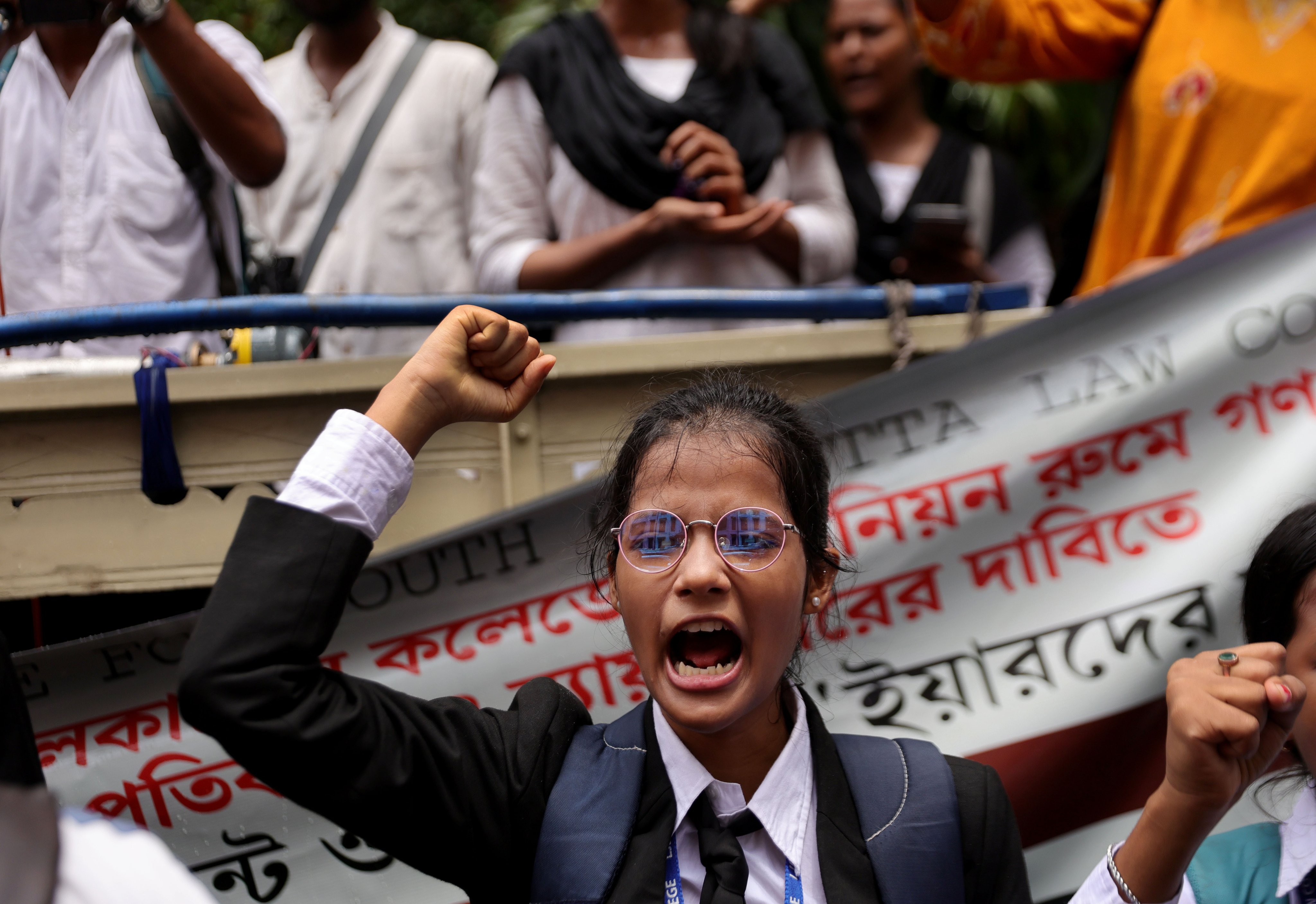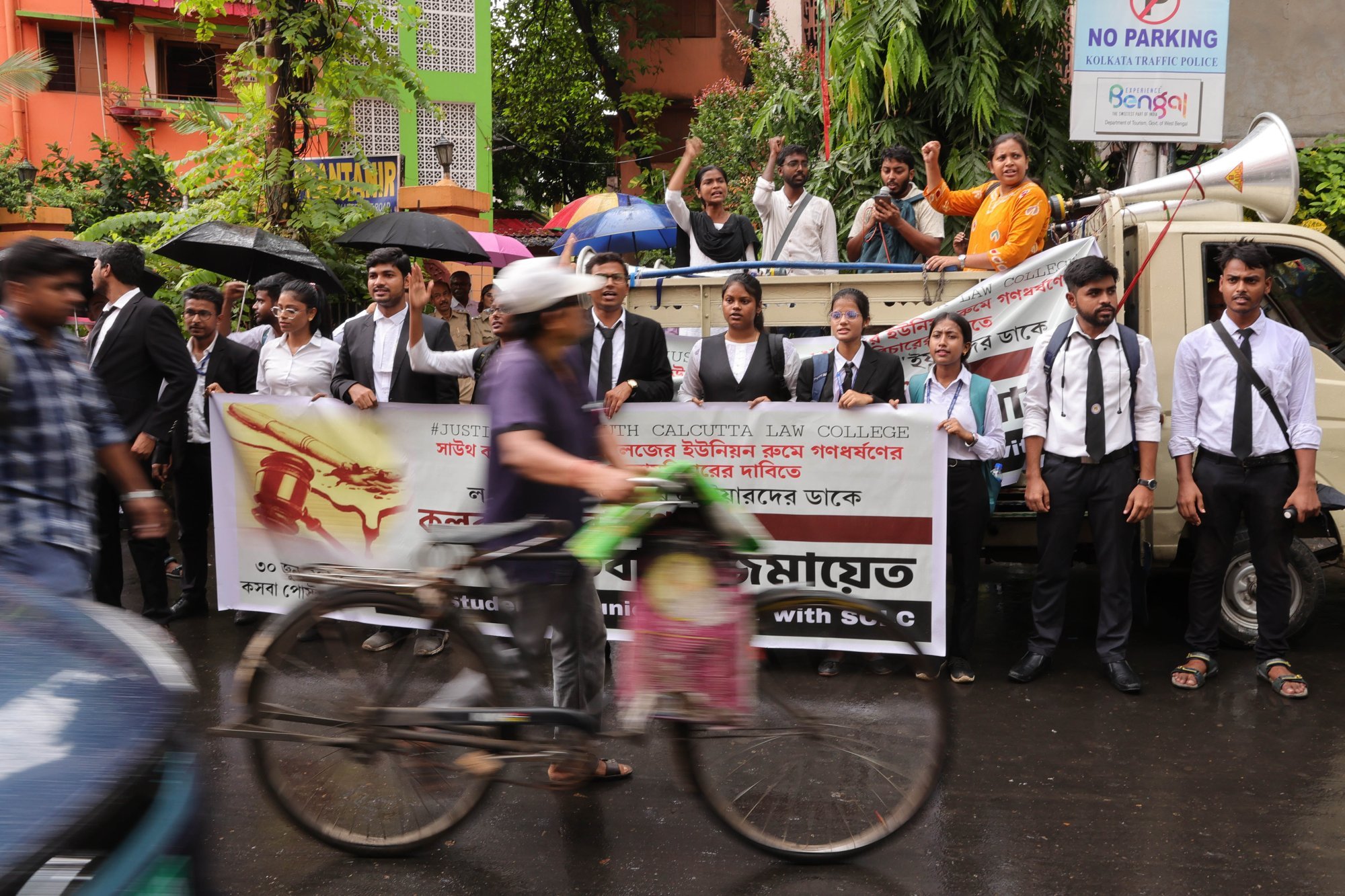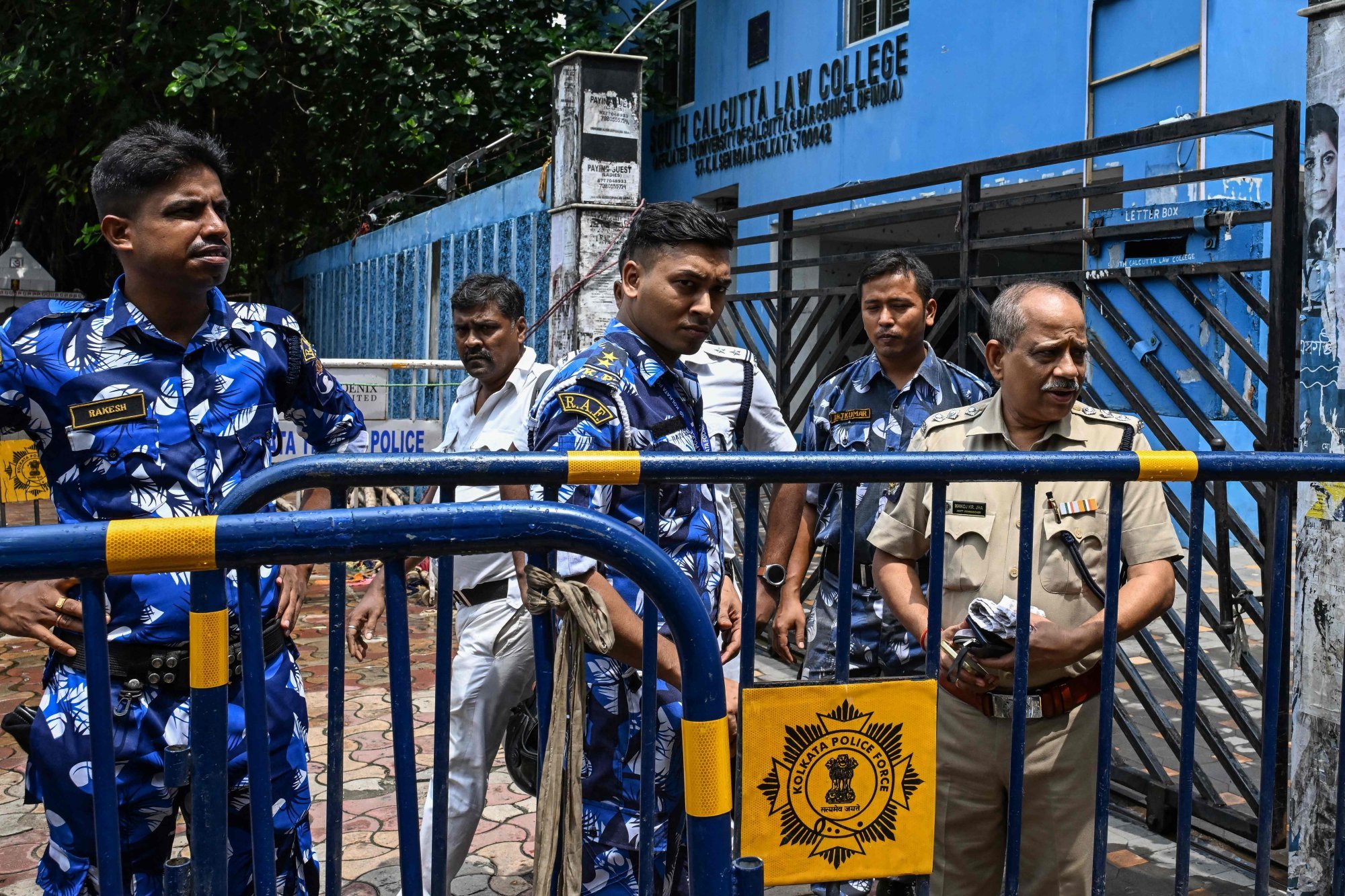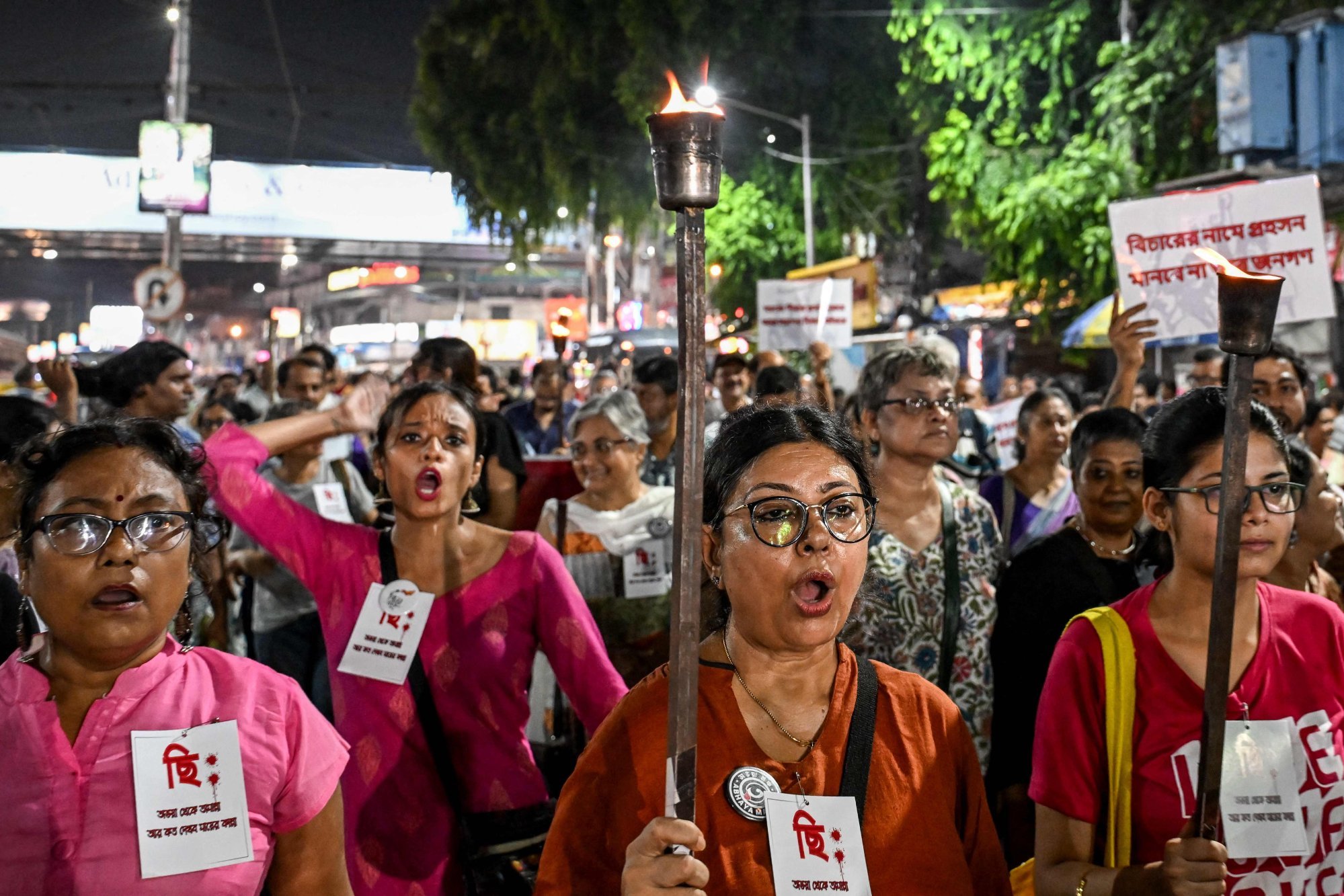Alleged rape of Kolkata student sparks debate over women’s safety in India
Analysts urge a more proactive response to ensuring women’s safety and not allow politics to overshadow the crime

The alleged rape of a law student at a Kolkata college – less than a year after a trainee doctor’s rape and murder sparked national outrage – has reignited debate over women’s safety in India and triggered political infighting in West Bengal’s ruling party.
The latest case took place on June 25 at South Calcutta Law College, where the student was allegedly lured to stay after hours by Monojit Mishra, a temporary college staff member who is also a former student previously affiliated with the ruling Trinamool Congress’s student wing.
He is accused of orchestrating the assault along with two current students, who allegedly restrained the victim and filmed the crime. All three, along with a security guard, have been arrested.
Authorities formed a special investigation team that reviewed CCTV footage, mobile phone data and medical evidence, which reportedly confirmed forced penetration and signs of physical assault. Investigators say the victim provided a detailed and timely complaint, helping expedite early arrests.

The Trinamool Congress acknowledged Mishra’s party ties, but said it would not interfere in the investigation. The case has triggered a political firestorm, with party leaders trading barbs and public outrage growing over the tone of some official responses.
Senior Trinamool MP Kalyan Banerjee drew criticism for remarking that women should be careful about who they associated with, while fellow party leader Madan Mitra said the victim should have avoided staying at the college after hours.
In response, Trinamool MP Mahua Moitra condemned the remarks on social media platform X, writing: “Misogyny in India cuts across party lines.” She added that her party condemned “disgusting comments no matter who makes them”.
Banerjee then hit back with a personal attack, alluding to Moitra’s recent marriage to veteran politician Pinaki Mishra and accusing her of “breaking up a family”. The party’s leadership has since stepped in to contain the public spat.
Analysts say the controversy has overshadowed urgent questions about justice and institutional accountability, especially in the run-up to the state election in March and April next year.
“The present incident [of the rape of a law college student] would not have been highlighted if the state assembly elections were not round the corner,” said Pratip Chattopadhyay, a political-science professor at the University of Kalyani.

Unlike the rape and murder of the trainee doctor last August – which sparked massive nationwide protests and brought Kolkata to a standstill for weeks – public outrage over the latest crime has been relatively muted.
Chattopadhyay said the two incidents were not identical, as the victim in the previous case was murdered, but the subdued public response this time round showed a degree of apathy towards law and order issues because they had become commonplace.
“People have lost faith, people have lost trust in day-to-day governance of the state,” he said.
The political opposition was equally to blame as it had not squarely focused on such issues, he added.
Last year, the Trinamool Congress-ruled government in West Bengal was lambasted for lax security, while investigators were also taken to task for mishandling the investigations.
Led by firebrand leader Mamata Banerjee, the Trinamool Congress has been in power in West Bengal since 2011 – one of the longest reigns by an opposition party.
Niharika Karanjawala-Misra, principal associate at law firm Karanjawala & Co, said authorities had acted swiftly in the latest incident and had been helped by the victim’s timely and detailed complaints.
Since last year’s rape incident, state authorities have stepped up security in state-run hospitals, with measures such as CCTV-monitored “safe zones” and designating retiring rooms for women, as well as ensuring women worked as a two-member crew during night shifts.
Karanjawala-Misra said, however, that these might not be enough.
“While such measures [ …] may prove to be useful, no evidence suggests that they have actually contributed to a lessening of crime against women or that the recent tragic law school assault may be seen more as the exception than the rule,” she said.
“The state government and other agencies must continue in their efforts to make all spaces safer for women.”
Dinkar Sharma, company secretary and partner at law firm Jotwani Associates, said merely initiating steps such as registering a police complaint and making arrests did not amount to a proactive response.
“Was the survivor’s statement recorded sensitively and in a trauma-informed manner? Was she offered legal aid, medical care and access to counselling? Has her identity been protected?” Sharma said, noting that issues such as these needed to be considered.
“True institutional pro-activeness must extend beyond headline management to restoring the survivor’s dignity, ensuring transparent investigation, and delivering swift justice,” he said.
But he rued that politics was overshadowing the crime.
“The crime has become entangled in a political narrative, rather than being addressed as a matter of legal and moral urgency. This trend is not unique to this case but part of a broader, troubling pattern in Indian political discourse,” Sharma said.

Gender sensitivity urged
The situation in West Bengal is unfortunate because the state historically has a reputation of being sensitive towards women, analysts say.
Support for women issues among voters remained, but several government welfare programmes offering monetary benefits to women had distracted attention from law and order issues, Chattopadhyay said.
Despite the incidents of crime, the Trinamool Congress still held an edge ahead of next year’s election because of the lack of any fundamental alternative model of governance by the state’s main opposition, the federal government’s ruling Bharatiya Janata Party, he added.
Nilanjan Mukhopadhyay, a political commentator, said the political row which erupted over the rape was likely to settle down, but the need to improve women’s security remained a concern.
The political row linked to the latest crime had also highlighted a bias towards women, especially the remarks against Moitra, he said.
“It is always the woman who is responsible for enticing the man away. How can we make such a presumption?” he said.